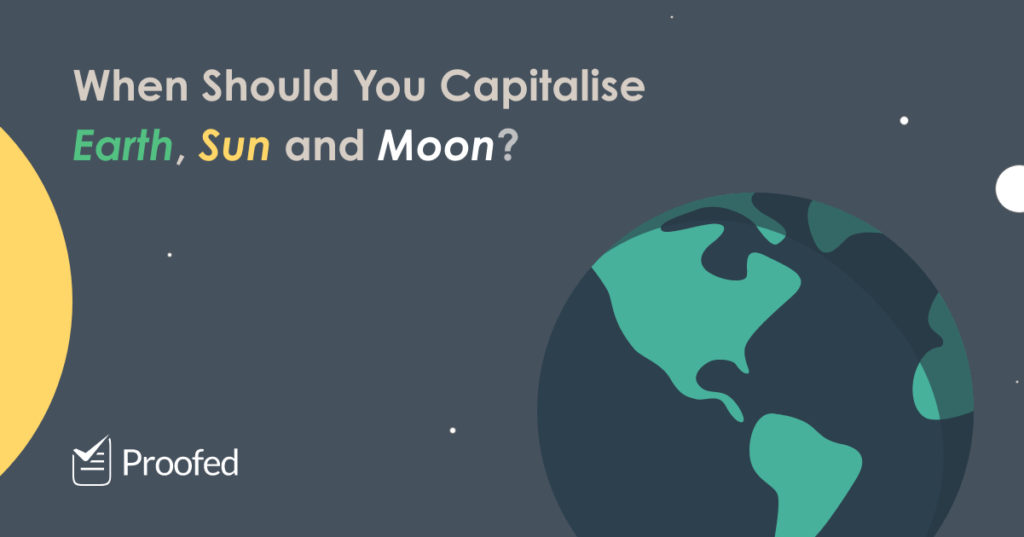The night’s sky can inspire many thoughts. A scientist might dream of finding a new planet. An artist, on the other hand, may find the beauty of the stars captivating. But as proofreaders, our minds immediately drift to capitalisation. So join us for a look at when to capitalise celestial objects.
Proper Nouns in Space
When we say ‘celestial objects’, we basically mean ‘naturally occurring space stuff’. This includes planets, stars, moons, galaxies, comets, and pretty much anything else that you might see in space.

We capitalise the name of a celestial object when it is a proper noun. Or in other words, we only start a word with a capital letter if it names a specific celestial body, not just a type. So, for instance, the word ‘planet’ is a common noun (i.e. a type of celestial body). ‘Uranus’, meanwhile, is a proper noun (i.e. a specific planet). As such, we don’t need to capitalise ‘planet’, but we do use a capital letter at the start of ‘Uranus’. Other examples include:
|
Common Noun |
Proper Noun |
|
planet |
Mars, Venus, Saturn |
|
moon |
Europa, Titan, Callisto |
|
star |
Polaris, Rigel, Sirius |
|
galaxy |
Milky Way, Andromeda |
|
comet |
Halley’s Comet, Hale-Bopp |
|
nebula |
Orion Nebula, Crab Nebula |
The key in most cases, then, is to think about whether you’re naming something generic or specific. However, there are a few words that can cause confusion, including ‘earth’, ‘sun’ and ‘moon’.
Find this useful?
Subscribe to our newsletter and get writing tips from our editors straight to your inbox.
How to Capitalise Earth, Sun and Moon
Certain ‘space’ words can be either common nouns or proper nouns. When we say ‘the moon’, for example, we’re usually referring to the round object we see in the night’s sky. However, other planets have their own moons, so how do you capitalise this term in those cases? Or others like it?
Sadly, there is no single ‘correct’ approach here. NASA, for instance, say:
Capitalize ‘Moon’ when referring to Earth’s Moon; otherwise, lowercase ‘moon’ (e.g. ‘The Moon orbits Earth’, ‘Jupiter’s moons’).
But other style guides, including MLA and Chicago, suggest using ‘sun’, ‘moon’ and ‘earth’ except when:
- Used with other planet names (e.g. ‘Mercury is larger than the Moon’).
- When ‘Earth’ isn’t preceded by ‘the’ (e.g. ‘The shuttle will return to Earth’), except in idiomatic expressions such as ‘what on earth’.
Ultimately, this may come down to which style guide you are using (or personal preference). Generally, though, we favour only capitalising ‘earth’, ‘sun’ and ‘moon’ when you are both:
- Referring to the Earth, its Moon or its Sun (not other moons or suns).
- Using ‘Earth’, ‘Sun’ or ‘Moon’ alongside other capitalised celestial objects, such as planet names, and/or when ‘Earth’ isn’t preceded by ‘the’.
So, following these rules, we would capitalise these terms as follows:
The sun is shining brightly today.
What on earth are you talking about?
The moon is almost full tonight.
The Earth is much closer to Mars than the Sun.
You should not, of course, capitalise ‘earth’ when referring to dirt or the ground. That kind of ‘earth’ is always a common noun.
Summary: How to Capitalise Celestial Objects
As a rule, you will only need to capitalise celestial objects when they are proper nouns. In practice, this means:
- Capitalising the names of specific objects (e.g. Saturn, Mars).
- Not capitalising generic objects (e.g. planet, star, galaxy).
This becomes a little more complicated with the words ‘earth’, ‘sun’ and ‘moon’. The rules here vary between different style guides and institutions, but we tend to capitalise these terms only when:
- Referring to the Earth, its Moon or its Sun (not other moons or suns).
- Using the term alongside other capitalised celestial objects and/or when ‘Earth’ isn’t preceded by ‘the’ (e.g. ‘Mars is Earth’s nearest neighbour’).
The most important factor, though, is applying a consistent capitalisation style throughout your work. And if you’d like a professional to check your writing, submit a document for proofreading today.



